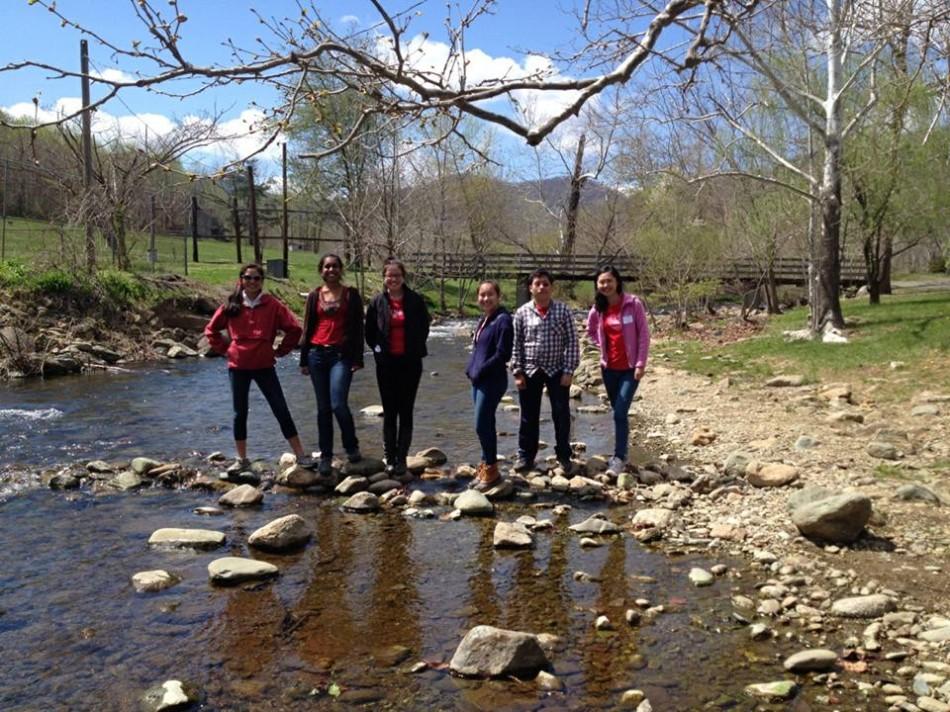Newly formed TJ Envirothon team excels at Regionals
Left to right: sophomore Virginia Sun, junior Teja Sathi and seniors Grace Chuang, Emma Gee, William Woodruff and Karen Xia represented Jefferson at the regional Envirothon competition.
April 27, 2014
On April 23, the TJ Envirothon team traveled to the scenic site of the regional Envirothon competition: Graves Mountain Lodge in Syria, Va.
The North American Envirothon Competition is a national competition that aims to increase environmental awareness for high school students through hands-on contests. Local, regional and state competitions are held to determine which teams will advance to the prestigious national competition, which is held every year over the summer.
The team that represented Jefferson at Regionals consisted of seniors Grace Chuang, Emma Gee, William Woodruff and Karen Xia, junior Teja Sathi and sophomore Virginia Pan, who served as an alternate. After a challenging and productive day, the team walked away with a third place finish, a remarkable feat for a team that has only existed for two years.
This year, TJ Envirothon, formed in the 2012-2013 school year, moved on to Regionals after placing second at the March 27 local competition, behind the Hidden Pond Envirothon team. Attending the regional competition was a big step forward for the students, but they went into unfamiliar territory with high hopes.
“We wanted to make it as far as possible just for the experience, so that the team next year can do even better,” Chuang said. “We managed to beat out a lot of teams that have existed for longer and have dedicated coaches preparing lessons for them.”
The regional competition was similar in structure to the local one in that the team members had to combine their expertise in four categories: aquatic ecology, forestry, wildlife and soil and land use. The final category, which changes from year to year, asked the teams to focus on sustainable agriculture and included an oral presentation on the optimal allocation of 40 acres of land to create a sustainable farm.
During the competition, participants rotated around to different stations, each of which had a hands-on challenge associated with one of the five categories. Some examples included identifying mounted animals and their skulls for the wildlife challenge or recognizing soil types and labeling soil layers for the soil and land use challenge.
“It’s fun because you run around outside instead of being holed up in a room,” Chuang said. “The test isn’t just defining terms and answering questions though; there’s always a real life application.”
For the Jefferson team, the regional competition was a significant step up in difficulty. To prepare for the various categories, the students prepared by writing study guides based off of sources from the Envirothon website and attending training sessions to gather more hands-on knowledge. The team also revised their oral presentation after receiving comments from the judges of the local competition.
According to Sathi, the most difficult category at for the team at Regionals was aquatic ecology.
“Aquatics included specific questions about what numerical requirements an area of land must have to be considered a wetland, riparian buffer or protected land,” Sathi said. “In aquatics, we again had to identify macro invertebrate samples but the quantity of samples to identify in 20 minutes was much greater than that of the local competition.”
At the regional level, the top three teams move on to the state competition. However, if more than one team is from the same area, then only the higher-placing team can advance. Unfortunately for the TJ Envirothon team, they finished behind the Hidden Pond team again, which eliminated them from advancing to the next level of the competition. As a result, the Jefferson team will have to wait another year before they can vie for a spot at States.
“Next year, we will try our best to repeat our successes this year and hopefully advance to States,” Sathi said. “However, with four of our team members graduating, Virginia and I will need to do some recruiting and preparation for new members.”






